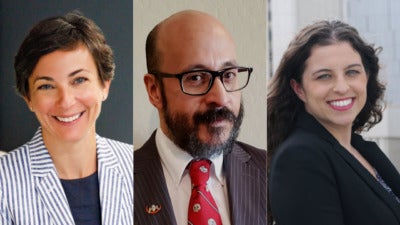A high-capacity, responsive, and agile local workforce ecosystem is critical as we work toward an equitable economic recovery. Yet, at the local level, practitioners often lack spaces where they can engage authentically across the many fields of practice, organization types, and government policies that make up the field. Below, we share one story of collaboration where leaders from three different institutions joined forces on a new writing course package boosted with exposure to the exciting and in-demand fields of artificial intelligence, cybersecurity, and drone technology.
The Greater Phoenix Workforce Leadership Academy (WLA) convened local leaders from nonprofit organizations, public agencies, businesses and business associations, and community colleges as Academy Fellows between 2021 and 2022. A partnership between the Aspen Institute Economic Opportunities Program and the Center for the Future of Arizona (CFA), the Academy provided time and space for senior leaders to learn from each other and explore opportunities for systems changes across the Greater Phoenix workforce ecosystem.

Drawing from an understanding of Arizona’s current workforce needs, Fellows Katie Belous (Director of Product, Pipeline AZ), Kim Hanes (Regional Manager, Maricopa County, University of Arizona), and Miguel Fernandez (Professor of English and Comparative Literature, Chandler-Gilbert Community College) came together to launch an innovative new set of first-year college writing composition courses that are now underway across the Maricopa Community College District.
Miguel Fernandez, who spearheaded creation of these courses at his institution, describes the value of the WLA fellowship:
“…[The other Fellows’] knowledge filled the gaps in my ideas, and their connections started the momentum that, as a frontline faculty, I would likely have missed. I can’t emphasize this enough: the Greater Phoenix workforce Fellowship nurtured the environment and connections that broke the artificial silos between academic and occupational interests and accelerated the reality of the idea of freshman composition courses contextualized for workforce needs in cyber, A.I. and drone.”
Katie shares that the new offering aims “to help students orient [themselves] and select a field of interest” by combining topical career exploration with First-Year Writing, a course already required for graduation. This could be good news for students who worry about piling on costly courses to figure out their interests. Additionally, without informed mentors in their local workforce ecosystems, many students are likely unaware of emergent opportunities in AI, cybersecurity, and drone. Arizona’s almost 20,000 unfilled positions in cybersecurity – a field with the 8th fastest growing occupation — means that the new courses will expose students to an industry* that “affords more job security than many other professions.”
“From day one, the required ENG101 and ENG102 courses engage students in activities and assignments that 100% meet standard composition course research and writing requisites, but also allow for career exploration related to cybersecurity, A.I., and drone as well as Arizona workforce opportunities,” says Miguel.
The fellowship connection through Workforce Leadership Academy sessions was the catalyst for the new course offerings. But Fellows built on other efforts across the Phoenix region focused on making it easier for students to navigate career pathways across high schools, the Maricopa County Community Colleges, and the University of Arizona. Local WLA partner, the Center for the Future of Arizona, regularly convenes industry and education sectors; Pipeline AZ’s technology hubs have been tailored to the needs of current and prospective Maricopa Community College students and middle school and high school learners; and there is a long term partnership between the University of Arizona (one of only 21 U.S. campuses designated a Center of Academic Excellence by the National Security Agency) and the Arizona Technology Council, where another Academy Fellow, Steve Zylstra, is president and CEO.
To stay up to date on the Workforce Leadership Academies, we invite you to visit the WLA webpage and join the larger Aspen Institute Economic Opportunities Program mailing list.
Share
Tweet An equitable economic recovery requires an agile local #workforce ecosystem. Fellows in Phoenix launched a new writing course package boosted with exposure to AI, cybersecurity, and drone technology. Read more from @AspenJobQuality and @arizonafuture.
Tweet “The Greater Phoenix workforce Fellowship nurtured the environment and connections that broke the artificial silos between academic and occupational interests.” —Miguel Fernandez @chandlergilbert
Tweet Arizona has thousands of open #cybersecurity jobs. This program in Phoenix — spearheaded by local #workforce Fellows — introduces students to an industry that “affords more job security than many other professions,” according to Katie Belous @PipelineAZ.
Tweet .@AspenJobQuality and @ArizonaFuture created the Greater Phoenix #Workforce Leadership Academy to provide space for leaders to work together and explore opportunities for local system change. Here’s a great example of the work they’ve been doing.

